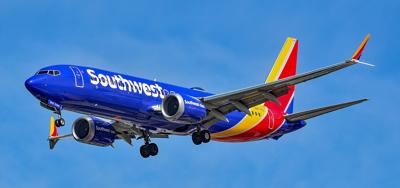
A Southwest Airlines plane
AUSTIN - The Texas Supreme Court has concluded the Southwest Airlines Pilots Association (SWAPA) has standing to pursue claims that Boeing fraudulently included its members to fly its 737 MAX jet, which crashed twice in as many years.
Boeing introduced the 737 MAX in 2011, presenting it as being more fuel-efficient than previous 737 models but similar enough that pilots could fly it with no additional training.
However, in October 2018 and March 2019, two MAXs crashed in Indonesia and Ethiopia, killing all 346 people on the two planes. Both crashes reportedly resulted, at least in part, from a new flight-stabilizing feature on which the pilots had not been trained, the high court’s opinion states.
Following the second crash, the Federal Aviation Administration grounded the MAX.
Prior to the crashes, SWAPA agreed on its members’ behalf that they would fly MAX aircrafts that Southwest had purchased.
After the MAX was grounded, SWAPA sued Boeing on behalf of itself and its members, asserting that Boeing interfered with SWAPA’s business relationship with Southwest and fraudulently induced the pilots to agree to fly the MAX.
In turn, Boeing argued that the federal Railway Labor Act preempts the claims and that SWAPA lacks standing to assert the claims on its members’ behalf.
SWAPA is a nonprofit labor organization and employee association that represents roughly 11,000 Southwest pilots and negotiates collective bargaining agreements (CBAs) on their behalf.
The high court found the act does not preempt the claims and that SWAPA has standing to assert the claims of its members who assigned their claims to SWAPA.
“We conclude that the Railway Labor Act does not preempt SWAPA’s claims because the resolution of those claims does not substantially depend upon interpretation of the parties’ CBA,” the opinion states. “We thus affirm the court of appeals’ judgment remanding the case to the trial court for further proceedings on the claims SWAPA asserts on its own behalf.”
Justice Jane Bland, joined by Justice Rebecca Huddle, dissented in part, opining that SWAPA does lack authority to pursue individual claims involving their members.
“This case involves the assignment of more than 8,000 individual claims to one nonprofit association, something unheard of in Texas law,” the opinion states. “For good reason. Business Organizations Code Section 252.007 does not grant nonprofit associations the right to pursue claims on behalf of their individual members if the lawsuit requires the members’ participation.
“The statute thus precludes the Southwest Airlines Pilots Association from pursuing claims to recover its pilots’ individual damages resulting from the 737 MAX’s grounding.”
Boeing is represented by the law firms of Haynes and Boone, Kirkland & Ellis, Tillotson Johnson & Patton and Carter Arnett.
SWAPA is represented by the law firms Wick Phillips Gould & Martin, Condon & Forsyth, and Lynn Pinker Hurst & Schwegmann.
Case No. 22-0631





